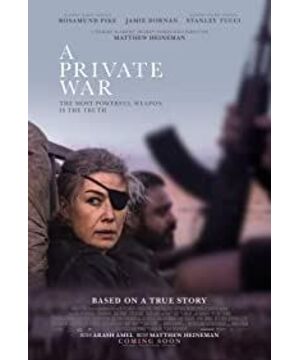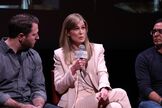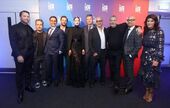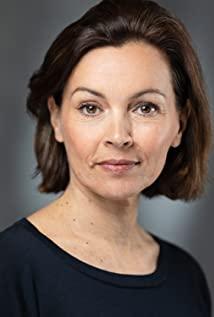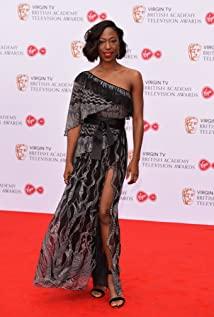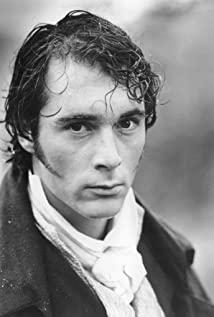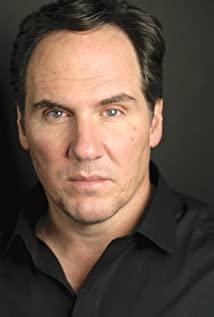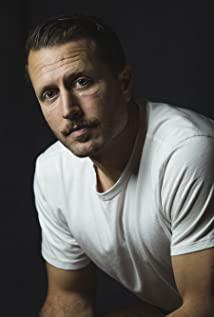I have watched a lot of dramas, and I will be asked from time to time, "Is it okay to watch the series?" It is easy to answer bad movies, and many movies really can't jump to conclusions. Compared with "good to see" and "must see", it is more common to say "worth watching" recently. It's worth it, maybe because of the outstanding acting skills, or because of the outstanding subject matter. Although it may not be a good show in a row, if you ask "Anyone take it away" after the show, it may be worth the ticket price compared to two hours of sensory stimulation. The film "First Sight Front" gives me the feeling that the meaning is greater than the work itself.
"Commemorating the one-eyed rose of the battlefield, a human war that cannot be 'one eye open and one eye closed'."
Adapted from real events, the film uses the new medium of film to present the legendary deeds of Mary Colvin, the "one-eyed female war correspondent" in the United States. Ordinary people's impression of a reporter may start from her writing, her pseudonym, her choice of words, her quotes in bold font, and then her worldview, the events she treats kindly, and the characters she criticizes harshly and issues. A friend said that after reading a person's writing for a long time, he will begin to recognize a certain style. If you read it later, you can probably recognize who wrote it from the title alone. Will loyal readers of the unknown Mary Colvin see the film with a hit-and-miss feeling?
For viewers who don't know the female war correspondent, "First Sight Front" can be said to be a fairly accessible start. The film begins with a sound bite in a personal interview by Mary Colvin, and ends with the same sound bite. The big picture has been made, and it is worth knowing about the motivation and spirit behind it.
Mary is the pillar of the international edition of the newspaper. She is brave and fearless by nature. However, he went up to the mountains and eventually met a tiger. Soon after the opening, it was mentioned that Mary lost her left eye in the battlefield of Sri Lanka. Normal people probably bought a lesson and faded out of the front line. But Mary made a comeback wearing a badass black blindfold and entered the Middle East without fear. Isn't she afraid? Afraid, and suffering from mental torment. But in life, there is always a mission, just like the editor who loves and hates her said: "It's not normal people who volunteer to go to the battlefield, but we need these very reporters."
But even people who are as heroic as Mary are passive and powerless in the end. The film repeatedly depicts journalists' pursuit of truth, justice, and the brilliance of humanity, and the most crucial of them is the brilliance of humanity.
Manpower is limited, and I am on the front line. Many times I can only watch one life after another leave. At night, I return to the safe area to write crazy books. Too personal an international event. As a matter of fact, blood and blood quickly numb people, and gunfights are not as attractive as cats. Frontline reporters don't want to guess the results. They can continue to believe in the goodness of human nature if they can step on the sand. A few winds and rains, Mary's perseverance in seeing death as home can be regarded as a model from the beginning to the end.
The persuasive power of "First Sight Front" is largely due to the excellent acting skills of Pei Chunhua (the Chinese name of the heroine Rosamund Pike). Mary Colvin herself. As for the quality of acting, my personal criterion is whether the audience can forget some of the famous roles that the actor has played in the past. Pei Chunhua has obviously changed his soul, playing an old smoker who has seen the world and experienced hardships. For the real interview clips at the end of the photos, this performance can be described as a three-pointed piece. In terms of plot, probably because it is subject to its own historical facts, the progress of the plot is relatively easy to estimate and lacks surprises. But still a solid war b-side work.
For practitioners, the biggest feeling will be the phrase "support only because there is still hope for the brilliance of human nature". In fact, everyone knows that no matter how much you write, you are far from the front line in a foreign country, and you can only hope that people in the Newsroom will put the "truth" on the front page, so that people in the metropolitan city can read it lightly at the elegant breakfast meeting. Sigh, Holy Crap, in addition to feeling good that you have given enough humanistic care to the war-torn sentient beings, you will continue to care a little more, so that it will have an impact.
I still remember discussing with my friends earlier that perhaps, movies will be the best carrier in history. The history book is out, and the contemporary spirit is, I would rather read the story with the mentality of watching Fiction, sort out the historical context from the fragmentary but essential fragments, and then slowly piece together the past. Even if it is a little more provocative for seasoning, it will be fine. Just like South Korea's "Adverse Power Series", "The Furnace" successfully overturned the case, and "Adverse Power Driver" pushed the Gwangju incident to the hot search. It is not an exaggeration to say that the awakening of public opinion and social movements started in the cinema.
Text: Kazuki’s original text was published in the Aoba Literature Club
View more about A Private War reviews


